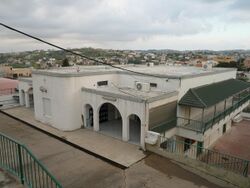Khalwa
Topic: Religion
 From HandWiki - Reading time: 3 min
From HandWiki - Reading time: 3 min
Khalwa (Arabic: خلوة, also khalwat; lit., "solitude"; pronounced in Iran, "khalvat"; spelling in Turkish, halvet) has several meanings in Sufism, Islamic jurisprudence, and the Druze religion, which in some way derive from the concept of being alone or withdrawing from the world.
Sufism
In Sufism, a solitary retreat, traditionally for forty days (see "chella"), during which a disciple does extensive spiritual exercises under the direction of a Sufi master.[1]
A Sufi murid will enter the khalwa spiritual retreat under the direction of a shaykh for a given period, sometimes for as long as 40 days, emerging only to pray and, usually, to discuss dreams, visions and live with the shaykh. Once a major element of Sufi practice, khalwa has become less frequent in recent years.
It is the act of total self-abandonment in desire for the Divine Presence. In complete seclusion, the Sufi continuously repeats the name of God as a highest form of dhikr, remembrance of God. Then, "Almighty God will spread before him the degrees of the kingdom as a test".
Other Sufi uses include:
- A religious school is known as "a khalwa"[2] in the Sudanese dialect of Arabic. This reflects the former dominance of Sufism in the Sudan.
- The Khalwati order (Halveti) of Sufism derives its name from the term "khalwa".
In Islamic jurisprudence
In Islamic jurisprudence, it is a state in which two people, male and female, are alone and, if unmarried, it is a state from which they ought to remove themselves. For example, in Malaysia in 2009, 197 students "were caught for khalwat" in the state of Kuala Terengganu within seven months. Muslims there who are unmarried, non-relatives of a person of the opposite sex can be apprehended by state religious police under the offence of khalwat (being in "close proximity" as The Star Online described it). Religious Department enforcement officers can conduct "checks, surveillance and raids to curtail khalwat cases," catch "students from secondary schools and higher learning institutes...for khalwat" and advise "youth organisations and student leaders on the bane of committing khalwat."[3]
The prohibition of khalwa in Islam is comparable to that of in Judaism of the equivalent concept of yichud.
In architecture
The underground prayer chamber in the traditional mosques of central Arabia (Najd) is termed a khālwa.[4]

Among the Druze, a prayer house is known as Khalwa.[5]
See also
- Chilla-nashini
- Ayyam al-Beed
References
- ↑ "Mevlevi Terms and Definitions". http://www.dar-al-masnavi.org/mevlevi-glossary.html.
- ↑ Revealed: chaining, beatings and torture inside Sudan's Islamic schools The Guardian, 2020
- ↑ "197 students caught for khalwat in schools - Nation | The Star Online" (in en). The Star Online (www.thestar.com.my) (Kuala Terengganu, Malaysia). 27 Aug 2009. https://www.thestar.com.my/news/nation/2009/08/27/197-students-caught-for-khalwat-in-schools/. "A total of 197 students from secondary schools and higher learning institutes here were caught for khalwat (close proximity) in the first seven months of the year. ...[S]tate Religious Department enforcement officers caught the offenders behaving indecently. The department has also embarked on prevention measures to reduce the menace by creating awareness in schools and colleges.... ...[S]enior officials from the state Religious Department are also in constant contact with youth organisations and student leaders to foster closer relationships and advise them on the bane of committing khalwat. ...[T]he department had also intensified checks, surveillance and raids to curtail khalwat cases in the state. ...[T]he scope of enforcement by the religious department covered checks at hotels, chalets, entertainment centres and recreational parks." Note that the article does not state what the consequences were for those caught.
- ↑ For an illustration of an example, see NBHC-SCTH. (2022). ٱلْمَمْلَكَة ٱلْعَرَبِيَّة ٱلسُّعُوْدِيَّة. الدِرْعِيّة. في حي السهل البجيري. مسجد الظويهر. Zenodo. https://doi.org/10.5281/zenodo.6967388
- ↑ Samy S. Swayd (2009). The A to Z of the Druzes. Rowman & Littlefield. p. xxxix. ISBN 978-0-8108-6836-6.
 KSF
KSF